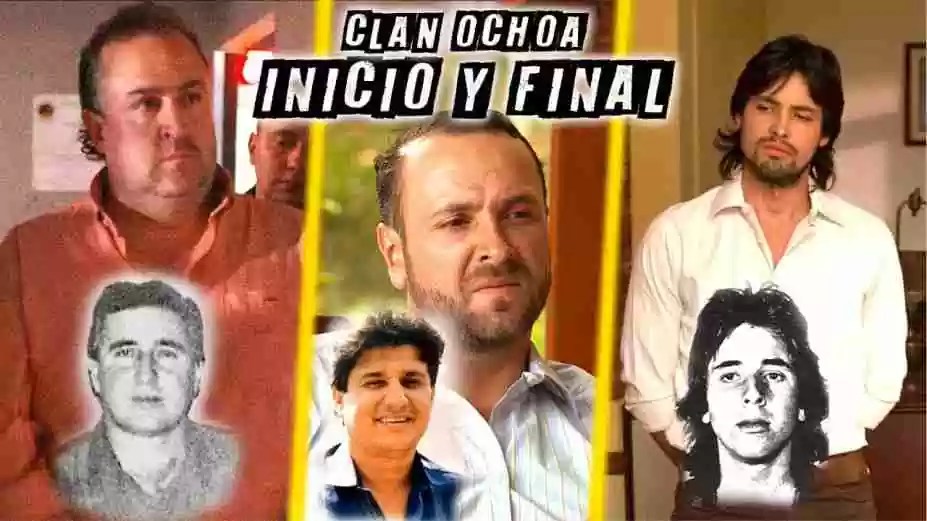Los Ochoa Traquetos: The Rise And Influence Of A Notorious Drug Trafficking Family
The Ochoa family, often referred to as "Los Ochoa Traquetos," has carved a significant niche in the annals of drug trafficking history. This family's notorious reputation and their involvement in the drug trade have made them a focal point of interest for both law enforcement and the public. Understanding their influence and operations provides an essential insight into the broader context of drug trafficking in Colombia and beyond.
In the late 20th century, Colombia became infamous for its drug cartels, with the Ochoa family being one of the most prominent players in this volatile landscape. Their operations were not only vast but also intricately linked to the socio-political dynamics of the country. The Ochoas, along with other cartels, shaped the narrative of Colombia's drug wars and the global drug trade.
This article will delve into the origins, operations, and eventual decline of Los Ochoa Traquetos, providing a comprehensive overview of their impact on Colombia and the world. Through detailed analysis and credible sources, we aim to present a balanced view of this controversial family.
Table of Contents
- Biography of Los Ochoa Traquetos
- Family Background
- Rise to Power
- Drug Trafficking Operations
- Legal Issues and Law Enforcement Crackdown
- Downfall of Los Ochoa Traquetos
- Cultural Impact and Legacy
- Conclusion
Biography of Los Ochoa Traquetos
Los Ochoa Traquetos, a name synonymous with drug trafficking, has its roots deeply embedded in Colombia's turbulent history. The family emerged as a powerful force during the peak of the cocaine trade in the 1980s and 1990s. Members of the Ochoa family were not just drug lords; they were also influential figures in their communities.
| Name | Date of Birth | Role |
|---|---|---|
| Jorge Ochoa Vásquez | 1947 | Co-founder of the Medellín Cartel |
| Fabio Ochoa Vásquez | 1955 | Co-founder of the Medellín Cartel |
| Juan David Ochoa Vásquez | 1957 | Drug trafficker and businessman |
Family Background
The Ochoa family, originally from Medellín, Colombia, was involved in various businesses before venturing into the drug trade. With roots in agriculture and livestock, they gradually transitioned into the burgeoning cocaine market, leveraging their connections and resources. Their involvement in the drug trade was marked by strategic partnerships with other key players in the Medellín Cartel.
Rise to Power
During the late 1970s and 1980s, the Ochoa family solidified their power within the Medellín Cartel, which was led by the notorious Pablo Escobar. The Ochoas played a crucial role in the cartel's operations, overseeing the production and distribution of cocaine. Their rise was fueled by a combination of strategic alliances, ruthless tactics, and a deep understanding of the drug market.
Key Strategies for Success
- Building strong alliances with local farmers for coca production.
- Establishing a robust distribution network across the United States and Europe.
- Utilizing violence and intimidation to eliminate competition.
Drug Trafficking Operations
The Ochoas were instrumental in developing sophisticated drug trafficking operations. They employed various methods to smuggle cocaine, including using airplanes, submarines, and even small boats. Their innovative approaches and willingness to adapt to law enforcement tactics set them apart from other traffickers.
Distribution Networks
By establishing extensive distribution networks, the Ochoas ensured a steady flow of cocaine into major markets. Key routes included:
- Transporting cocaine from Colombia to Florida and New York.
- Utilizing Caribbean islands as transshipment points.
- Collaborating with other cartels to expand their reach.
Legal Issues and Law Enforcement Crackdown
As the Ochoas' power grew, so did the attention from law enforcement agencies. The Colombian government, in collaboration with U.S. authorities, initiated a crackdown on drug trafficking operations in the late 1980s. This led to numerous arrests and increased violence as the cartel fought to maintain its territory.
Major Arrests and Trials
The Ochoa family faced significant legal challenges, with several members arrested and tried for drug trafficking. Some of the most notable events include:
- Jorge Ochoa's arrest in 1990 and subsequent extradition to the United States.
- Fabio Ochoa's capture and imprisonment in the 1990s.
- Juan David Ochoa's legal troubles and eventual exile.
Downfall of Los Ochoa Traquetos
The decline of the Ochoa family's influence can be attributed to various factors, including increased law enforcement pressure, internal conflicts within the cartel, and the rise of rival groups. By the late 1990s, the Medellín Cartel had largely disbanded, and the Ochoas were forced to retreat from the limelight.
Cultural Impact and Legacy
Despite their criminal activities, the Ochoa family has left a lasting impact on Colombian culture. Their story has been depicted in various films, books, and documentaries, highlighting the complexities of drug trafficking and its effects on society. The Ochoas serve as a reminder of the broader issues surrounding drug trade and its implications for Colombia and the world.
Conclusion
In summary, Los Ochoa Traquetos represent a significant chapter in the history of drug trafficking in Colombia. Their rise to power, intricate operations, and eventual downfall illustrate the complexities of the drug trade and its repercussions on society. As we reflect on their legacy, it is essential to consider the broader implications of drug trafficking and the ongoing challenges faced by law enforcement and communities.
We encourage readers to share their thoughts on this topic in the comments below, and to explore more articles on the history of drug trafficking and its cultural impact. Your engagement helps us create valuable content that informs and educates.
Thank you for reading, and we hope to see you back soon for more insightful articles!
Article Recommendations
- Cynthia Erivo Her Journey And The Truth About Cancer
- What Did Erins Dad From Rhony Die From A Comprehensive Exploration
- Carrie Cummings Real Name Unveiling The Truth Behind The Persona


